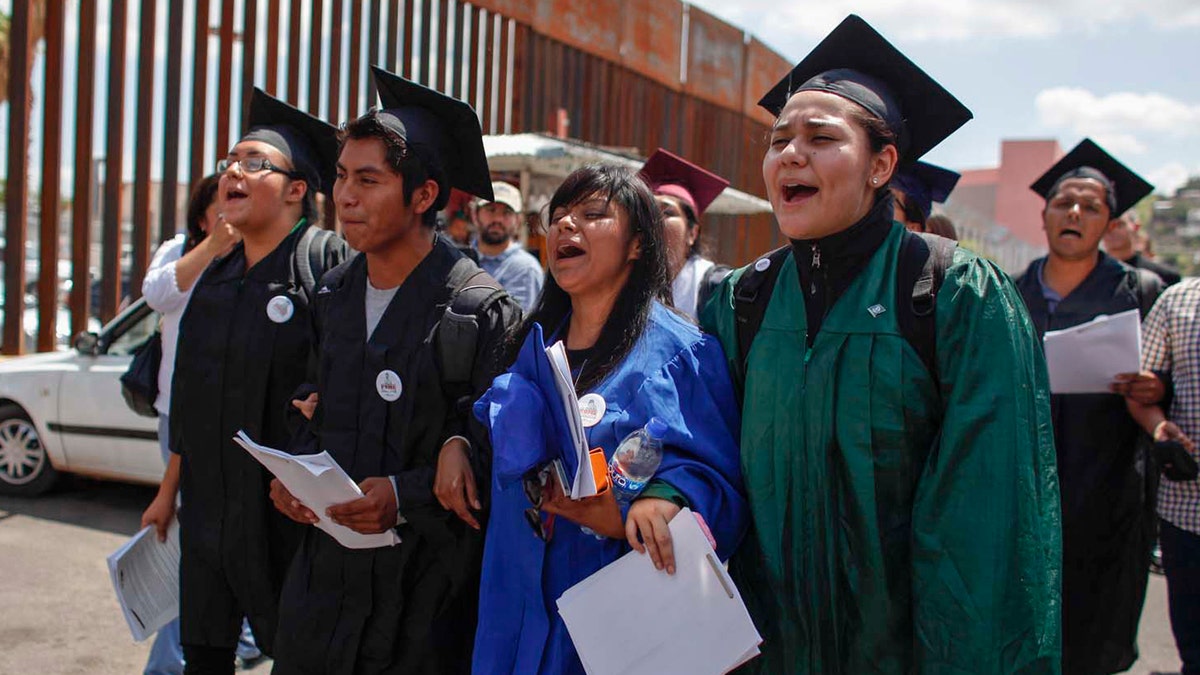
On July 22, 2013, a group of "Dreamers" marched to the U.S. port of entry in Nogales, Mexico, where they requested humanitarian parole. (AP2013)
It has been over 24 hours since nine young immigrants were released from detention after engaging in what has been characterized as one of the most courageous acts of civil disobedience in the history of U.S. immigration law. If the law remains unchanged it could be years before they are scheduled for a merits hearing on their underlying claims for asylum. If they win they will take their first step on the ever elusive pathway to citizenship. If they lose they will be deported.
The question has been asked, why did these nine individuals risk so much for what may be so little?
When I am standing before an immigration judge with an undocumented parent of two citizen children facing deportation I can tell you with absolute certainty that I have never once been asked “when will I be eligible to vote."
The organizers of the DREAM 9 protest explain that it was to provide a voice for the voiceless 1.7 million deported since President Obama took office, to recognize the devastating separation of families, and most importantly to bring their community home. Some have said the protest served to highlight the systemic human rights concerns in deportation detention. Others cynically dismiss it as a distraction to shame the President. What I find conspicuously absent from any of these explanations is a plea for a pathway to citizenship.
And why is that important?
The biggest impediment to immigration reform is just that, a pathway to citizenship. The Democrats demand it, and the Republicans reject it. This is little more than politicians fighting over votes in the elections to follow.
That is the real distraction.
When I am standing before an immigration judge with an undocumented parent of two citizen children facing deportation I can tell you with absolute certainty that I have never once been asked “when will I be eligible to vote.”
No, the undocumented community’s concerns are much more practical. Ask anyone facing deportation whether they care if reform includes an immediate pathway to citizenship, and they will tell you they just don’t want to be separated from their family.
They also want an opportunity to work in this country legally, and obtain a social security number to pay their taxes. They want a license to drive their kids to school. They dream of having the ability to leave the country periodically, without penalty, so that they can be at their sick mother’s side, or to attend a funeral. These are the real world concerns that plague them on a day to day basis and what shutters them in the shadows. To borrow a phrase from my friend and colleague Chuck Kuck, what they are looking for is a pathway to legality.
And so you ask what would a pathway to legality look like? If it were up to me it would provide a temporary renewable status that brings people out of the shadows, and provides employment and travel authorization. It could be renewed indefinitely in the absence of disqualifying criminal grounds of removal. It would require a one-time payment of a penalty fee, and a substantially lower filing fee for renewals, which would be required every ten years.
Although there would be no independent pathway to citizenship baked in, you would not be precluded from obtaining a Green Card and ultimately citizenship through the normal channels. For this solution to work properly an increase of immigrant visa numbers would be required as Congress deems appropriate. Sprinkle in a robust skilled and guest worker program to afford future immigrants an opportunity to come to this country legally.
In sum, a middle-of-the-road solution that actually solves problems.
Maybe the legacy of the DREAM 9 will be that our politicians in Washington stop fighting to win elections, and turn their attention to solving problems.
One can only DREAM.
